
When was the last time you saw a comedy in which an elderly female character wasn’t made the butt of the joke? When was the last time you saw an intergenerational relationship depicted in all its potential richness? When was the last time you saw a family drama that managed to grip you without resorting to soap opera melodramatics?
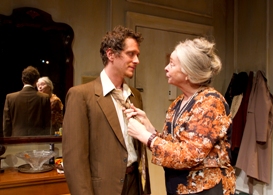 Amy Herzog’s Obie-winning dramedy 4000 miles is that exceptional play, one which does all of the above…and more, making it no wonder that the 2013 Pulitzer Prize finalist has become one of the country’s most produced plays, its latest production an absolutely splendid one at South Coast Repertory.
Amy Herzog’s Obie-winning dramedy 4000 miles is that exceptional play, one which does all of the above…and more, making it no wonder that the 2013 Pulitzer Prize finalist has become one of the country’s most produced plays, its latest production an absolutely splendid one at South Coast Repertory.
Herzog’s protagonists are 91-year-old Vera (Jenny O’Hara) and 21-year-old Leo (Matt Caplan), grandmother and grandson seven decades apart in age who will, over the course of 4000 Miles’ several month time span, change each other’s lives in relatively minor but nonetheless significant ways. Neither is perfect, and Herzog presents them warts and all, but by the time Leo is ready to head back on his way after an extended visit with Granny, you will likely have fallen a bit in love with both.
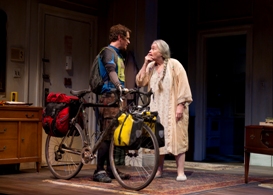 4000 Miles starts quietly, with Leo’s late-night arrival at Vera’s spacious, book-filled Greenwich Village apartment, bicycle in tow. We learn that he has biked all the way from Seattle, and that if it is a “we” who set off on the cross-country trek, it is an “I” who has arrived in New York—and we surmise that something bad, something really bad, must have happened along the way.
4000 Miles starts quietly, with Leo’s late-night arrival at Vera’s spacious, book-filled Greenwich Village apartment, bicycle in tow. We learn that he has biked all the way from Seattle, and that if it is a “we” who set off on the cross-country trek, it is an “I” who has arrived in New York—and we surmise that something bad, something really bad, must have happened along the way.
Vera can see through Leo’s “Everything’s fine” bravado, telling him, “I did want to say how sorry I am,” which Leo interrupts with a brusque “Thank you,” the better to change the subject. It’s not until the following morning that the name Micah is mentioned, and then only twice, briefly in passing, first when Leo tells Vera, “Micah never sent an email. His whole life, which was stubborn as shit, but you have to admire it,” and later, when he hints at his reason for coming to New York. “It was to finish something I started,” Leo explains. “Micah and I started something. I finished it. That’s it.”
A lesser playwright might feel tempted to reveal all within the first few minutes. Herzog parses out bits of information and allows us to string them together little by little, bit by bit.
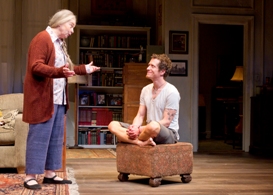 We learn early on of Grandma Vera’s pro-peace, pro-Cuba politics (once a Marxist, she is still very much a progressive) and that her left-leanings have been a thorn in her relationship with Leo’s mother Jane, though Leo—who won’t accept a banana from her because of “jet fuel” and there being “no such thing as a local banana”—seems pretty much on the same leftist page as his grandmother, and not on any better terms with Jane than Vera is.
We learn early on of Grandma Vera’s pro-peace, pro-Cuba politics (once a Marxist, she is still very much a progressive) and that her left-leanings have been a thorn in her relationship with Leo’s mother Jane, though Leo—who won’t accept a banana from her because of “jet fuel” and there being “no such thing as a local banana”—seems pretty much on the same leftist page as his grandmother, and not on any better terms with Jane than Vera is.
We learn too that Leo’s girlfriend, who lives in New York, has told him that she needs to “do some thinking,” which Leo says he respects because, as he puts it, “thinking is good,” though we sense that this was not the welcome he was expecting upon arriving on her doorstep.
And we get a sense of what kind of a woman Vera is, still feisty at ninety-one, still fairly sure of foot, at least on her home turf, though her frequent use of “whadayacallit” as an all-purpose noun, verb, or adjective bears witness to the passing of time, and an intellectual’s frustration at losing her way with words.
Later scenes fill in blanks, though not all of them, which is fine, since unlike a TV sitcom, 4000 Miles doesn’t need to tie up all its threads.
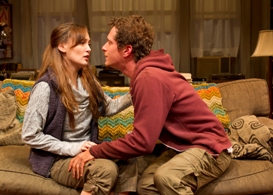 We do get to meet Leo’s girlfriend Bec (Rebecca Mozo), whose absence on his cross-country bike trek still rankles, and whose attitude towards a partner caught cheating turns out to be considerably less open-minded than Vera’s was during her marriage to Leo’s grandfather.
We do get to meet Leo’s girlfriend Bec (Rebecca Mozo), whose absence on his cross-country bike trek still rankles, and whose attitude towards a partner caught cheating turns out to be considerably less open-minded than Vera’s was during her marriage to Leo’s grandfather.
We also meet Amanda (Klarissa Mesee), a nineteen-year-old Chinese-American coed Leo brings back to Grandma’s for a late-night bit of hanky-panky that doesn’t quite turn out as hoped for once the topic of Vera’s Marxist past comes up.
And over the course of the several months of Leo’s visit, we watch as a grandmother’s love becomes a force of healing, of reconciliation, and of growth.
South Coast Rep Founding Artistic Director David Emmes directs 4000 Miles with subtlety, finesse, and the wisdom of a man who has for fifty years called SCR home—and who elicits pitch-perfect performances from his cast of four, and his two stars in particular.
O’Hara’s exquisite portrait of a nonagenarian whose grasp of language may not be what it used to be but whose life force remains as strong and vital as ever is yet another piece of brilliant character work by one of Southern California’s true theatrical treasures.
Matching her every step of the way is Caplan, who follows a string of Broadway musical theater credits with a richly satisfying “legit” performance as the alternately charming/bratty Leo. As for onstage chemistry, I cannot recall ever seeing more palpable love between two characters seven decades apart in age than O’Hara and Caplan give us in Vera and Leo.
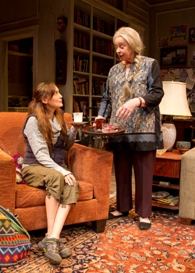 Mozo is terrific as always as an independent woman fallen out of love with a man who is constantly disappointed in her. And Mesee couldn’t be more delightful as a New York City “Valley Girl” smitten with “real live mountain man” Leo till his grandmother’s politics makes her unsure if she can “get it on in a communist’s apartment.”
Mozo is terrific as always as an independent woman fallen out of love with a man who is constantly disappointed in her. And Mesee couldn’t be more delightful as a New York City “Valley Girl” smitten with “real live mountain man” Leo till his grandmother’s politics makes her unsure if she can “get it on in a communist’s apartment.”
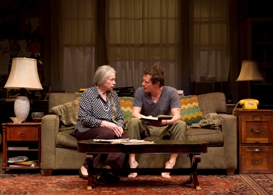 Scenic designer Ralph Funicello’s Greenwich Village apartment demonstrates as much attention to detail as you’re ever likely to see in a single-set design, with doorways that reveal other rooms when opened, and shelf after shelf of books accumulated over decades. Lonnie Rafael Alcaraz’s lighting is masterful as well, and never more so than in a key scene between grandmother and grandson that takes place in near darkness which Alcaraz makes us believe our eyes (and not his lighting) have slowly adjusted to. Sara Ryung Clement has designed costumes that are exactly what each character would have decided to put on upon waking. Cricket S. Myers’ sound design links scenes with mesmerizing instrumental versions of ‘60s hits by Bob Dylan, Creedence Clearwater Revival, and the like, a soundtrack of Vera’s younger years.
Scenic designer Ralph Funicello’s Greenwich Village apartment demonstrates as much attention to detail as you’re ever likely to see in a single-set design, with doorways that reveal other rooms when opened, and shelf after shelf of books accumulated over decades. Lonnie Rafael Alcaraz’s lighting is masterful as well, and never more so than in a key scene between grandmother and grandson that takes place in near darkness which Alcaraz makes us believe our eyes (and not his lighting) have slowly adjusted to. Sara Ryung Clement has designed costumes that are exactly what each character would have decided to put on upon waking. Cricket S. Myers’ sound design links scenes with mesmerizing instrumental versions of ‘60s hits by Bob Dylan, Creedence Clearwater Revival, and the like, a soundtrack of Vera’s younger years.
Jackie S. Hill is production manager. Sue Karutz is stage manager.
Arriving in the month in which we American’s celebrate Thanksgiving, 4000 Miles is indeed a play to be thankful for, though February would have been an equally appropriate month for its South Coast Rep debut. After all, could any grandmother wish for a more heartfelt Valentine than Herzog’s to her own Grandma Leepee?
South Coast Repertory, 655 Town Center Drive, Costa Mesa.
www.scr.org
–Steven Stanley
November 5, 2013
Photos: Debora Robinson/SCR
Tags: Amy Herzog, Jenny O'Hara, Matt Caplan, Orange County Theater Review, South Coast Repertory


 Since 2007, Steven Stanley's StageSceneLA.com has spotlighted the best in Southern California theater via reviews, interviews, and its annual StageSceneLA Scenies.
Since 2007, Steven Stanley's StageSceneLA.com has spotlighted the best in Southern California theater via reviews, interviews, and its annual StageSceneLA Scenies.







 COPYRIGHT 2025 STEVEN STANLEY :: DESIGN BY
COPYRIGHT 2025 STEVEN STANLEY :: DESIGN BY